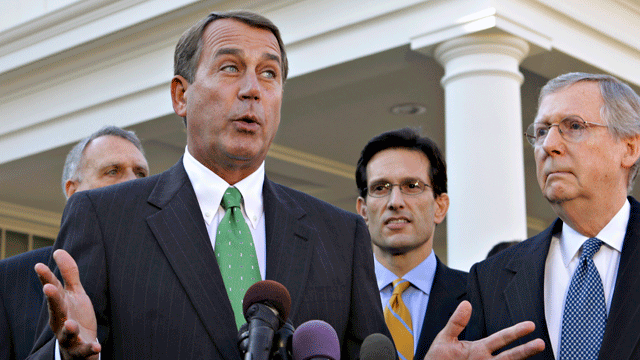
In this Jan. 23, 2009, file photo House Minority Leader John Boehner of Ohio, second from left, accompanied by other Republican Congressional leaders talk to reporters outside the the White House in Washington after meeting with President Barack Obama. (AP)
Once the dust settles on Election Day, Republicans could very well be in control of the House if not the Senate as well as most governorships across the country, benefiting from a wave of voter anger over the economy and profound pessimism about the future.
While big-state races in Florida, Ohio, Illinois and California remain intensely competitive into the campaign's final hours, the Democratic effort to retain control of the House is a lost cause, according to political strategists in both parties and public opinion polls.
Republicans must win 40 seats to gain control of the House and 10 to take the Senate. Most political analysts predict Republicans will win more than 50 seats in the House but under 10 in the Senate.
Larry Sabato, director of the Center for Politics at the University of Virginia, predicts Republicans will capture the House but fall short in the Senate by two seats.
But he told Fox News that "the big surprise on election night could be a Republican takeover of the Senate because all six times since World War II when the House has split parties one way or the other, the Senate has flipped the very same way even when it could not be seen or predicted in advance."
"I've been through a lot of election nights, I can't remember one when the experts weren't surprised by a dozen or more races," he said.
A victory in either case would spell the end of a two-year stretch in which Democrats controlled the White House and held comfortable majorities in both houses of Congress.
With unemployment at 9.6 percent nationally and economic growth anemic, as many as 100 seats appeared competitive or ripe for turnover in the 435-member House -- a list that included two dozen or more already given up for lost by the Democrats.
After absorbing thrashings at the hands of voters in 2006 and 2008, Republicans guarded against public displays of overconfidence. In private, though, their debate was not whether they would win a House majority, but the size of the victory margin.
Publicly, Democrats betrayed no expectation that their House majority was at an end. House Speaker Nancy Pelosi, D-Calif., turned aside any and all questions about the possibility of a night that would end her four-year tenure as the first female speaker in history.
But there was nothing bullish about the Democrats' late-campaign pronouncements.
"While there is some evidence that the Democrats' efforts are starting to pay off, the party still has ground to cover," said an Oct. 27 memo from Anzalone Lizst Research, a Democratic polling firm.
The ubiquitous polls were maddeningly inconsistent on many points. But most agreed that voters preferred Republicans over Democrats in hypothetical matchups, one key indicator of voting behavior, and also that independents were swinging back to the GOP for the first time since President George W. Bush's re-election in 2004.
The economy dominated all else, although the discovery of an apparent Al Qaeda terror plot aimed at the United States four days before the elections served as a reminder that all concerns were not domestic.
An Associated Press-GfK poll taken Oct. 13-18, found 59 percent of voters thought the country was heading in the wrong direction.
Republicans campaigned as advocates of tax cuts to stimulate the economy and promised at the same time to cut federal spending, tackle the deficit and reduce the reach of the government in general, though they offered few specifics. The agenda was a reaction to the 2008 bailout of Wall Street, the government's partial takeover of the auto industry and the economic stimulus and health care overhaul Obama won from Congress. Some Republicans, including Rep. Mike Pence of Indiana, said "there will be no compromise" on spending, debt control or an attempt to repeal the health care law.
In rebuttal, Democrats said Republicans had wrecked the economy once and were promising a return to the same policies they had pursued before.
Whatever the outcome, the election was the costliest at any midterm in history -- and one of the coarsest.
The incomplete tab was $3.6 billion and growing, with final disclosure reports not required until after Election Day. That included spending by candidates, the political parties and independent organizations, the most prominent a pair of groups with a sterling Republican pedigree that raised tens of millions from anonymous donors and spent it attacking Democratic candidates.
Obama and the Democrats sought to make an issue of that, warning repeatedly that foreign money might be influencing an American political campaign.
But with the economy running in idle, they got little traction for that argument, or most of their others.
Republicans also are poised to wrest control of governorships from Democrats in all regions of the country.
In all, there were 37 governors' races on the ballots, 19 currently held by Democrats and 18 by Republicans.
Apart from bragging rights, the statehouse races carried extra significance in the run-up to the post-census redistricting of House districts required by the Constitution. In many states, the governor has a vote in determining the new boundaries in what is often an intensely partisan event.
The Associated Press contributed to this report.




